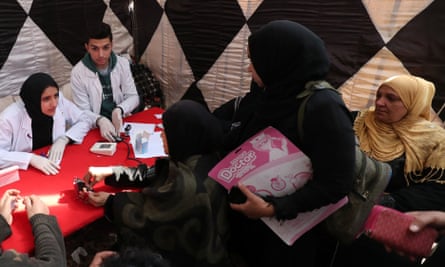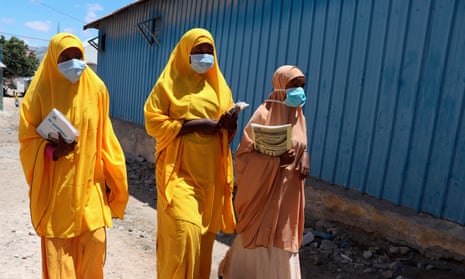Covid-19 has exposed just how much work remains to be done to wipe out female genital mutilation (FGM) around the world. Two million girls who would otherwise be safe from the practice are believed to be at risk over the next decade as a direct result of the virus.
As lockdowns linger and economies tumble, many families have been spurred into action over the fate of their daughters, using school closures to cut them and marry them off, campaigners say.
Although the UN has set a 2030 deadline to end FGM, activists claim that seems unlikely, given the mass cuttings in parts of Africa.
In Kenya, girls are being cut by the dozen as parents look to gain financial security during the pandemic, said anti-FGM campaigner Domtila Chesang, from West Pokot county.
Although FGM was outlawed in Kenya in 2011, one in five women and girls aged 15 to 49 has been cut. Before coronavirus hit, the campaign to eradicate the practice was making small gains in West Pokot county, which borders Uganda, but Chesang believes about 500 girls have undergone FGM in the area since the end of April.
“We now have the highest number of prosecutions ever witnessed because we’ve been putting a lot of pressure on the administration and police department, with the help of social media and activists, to get public attention,” said Chesang, who has been travelling around the region, campaigning and speaking on radio programmes.
“Being in school is the main reason girls don’t get cut. The girls are safe in school. With the schools closed, there’s no alternative – they are left to the mercy of their parents and communities.”

She received a call recently from a woman whose sister, a third-year university student, had been forced to undergo FGM during a mass cutting. Another call told her about a 12-year-old who was among 20 girls cut at the same time and is now being treated in hospital after a haemorrhage, added Chesang.
“There is a direct connection between the increase in cuttings and Covid-19 because unlike other ‘holidays’, where the community has something to look forward to, this is different: there’s no clear message on what will happen next and it throws people into confusion,” she said. One family had even exhumed a daughter’s body to perform FGM on it and “ward off poverty and calamity”.
“People see there’s no hope of going back to school so they have put the girls through FGM out of idleness. It’s a rite of passage, and it’s a predecessor to child marriage, because as soon as a girl comes of age she is seen as ready to be married off. I am distressed and overwhelmed; we have gone back to zero [in terms of progress] in some areas. But at least I’m able to report first-hand a true picture of what is going on.”
Somalia has the world’s highest rate of FGM, with an estimated 98% of women having undergone the procedure. The UN population fund, UNFPA, estimates 290,000 girls will be cut in Somalia this year, with many forced to endure the most severe form of FGM, in which the external genitalia are removed or repositioned and the vaginal opening is sewn up, leaving only a small hole through which to later pass menstrual blood. The operation is often performed by untrained midwives or healers using knives, razors or broken glass.
Somali-born FGM survivor and campaigner Ifrah Ahmed is on the phone to activists every day – sometimes every hour – as they campaign against FGM on the ground in Somalia, particularly in IDP (internally displaced person) camps where they talk about washing hands and keeping girls safe from gender-based violence.
But it doesn’t seem to be making much of a difference, said Ahmed. “FGM has increased because the girls have been out of school since March and mothers feel that now is a good time for their girls to get cut,” she said.
“We know it’s an emergency situation. Even in Mogadishu, the private hospitals have been closed due to Covid-19, so if anyone is sick they have to go to a certain hospital that’s open. If a girl is cut and bleeding, the family won’t take her to the hospital for help because they’re afraid of [catching] Covid.”
Ahmed said media training was planned in the week commencing 15 June to engage local journalists and establish the best move forward, as FGM seemed to have taken on disturbing trends, such as serving as a “social” experience for families to meet during lockdown.
She said: “It lets you call your neighbour and say: ‘The cutter is coming tomorrow to cut my daughter,’ and the neighbour will say: ‘This is wonderful, I have three daughters, I will also get them cut tomorrow.’ Then the next thing you know, the cutter has nine girls instead of one to cut,” said Ahmed.
Although FGM in Somalia is constitutionally illegal, pressure from conservative and religious groups has prevented lawmakers from legislating to punish offenders. Ahmed has been pushing forward a bill to end FGM since 2014 and hoped it would be passed this year. But political tension surrounding the first democratic vote in more than half a century – scheduled for later this year – has raised fears the bill may be stymied or postponed.
Egypt has the largest number of women and girls who have undergone FGM in the world. It has been illegal since 2008 and was criminalised in 2016, but many parents continue to force their daughters into it as a rite of passage; 87.2% of women aged 15 to 49 – more than 27 million – are believed to have been cut.
Authorities have long struggled to curb the practice, which traditionally dictates proof of sexual purity. But with the powers that be focused on fighting off the virus, Covid-19 has allowed FGM, and other gender-based violence, to take place without anyone watching at all, said Reem Abdellatif, an Egyptian-American anti-FGM activist and journalist.
“Under the guise of coronavirus, a lot of abuses against women are taking place, whether it’s FGM or domestic violence at home,” she said. “It is the only thing anyone can think about. A lot of people in Egypt are living under the poverty line and everyone’s going into panic mode.”
Just as in Kenya and Somalia, many parents of girls in Egypt are keen to curb sexual “promiscuity” and promote financial and social stability through marriage. An Egyptian man who tricked his three daughters into being cut is awaiting trial after telling his daughters he was going to vaccinate them against coronavirus, then forcing them to undergo the procedure.
Abdellatif alleges that her own mother, who threatened multiple times to have her cut as a child, tried last week to marry her off in a bid to provide her with security at a time of global economic downturn.
“If I am a 32-year-old woman and [now] live in a country like the Netherlands, and my mother can still threaten me with this, then you can only imagine the threats facing millions of girls who live in Egypt’s slums and villages with little or no hope of escape,” she said.
